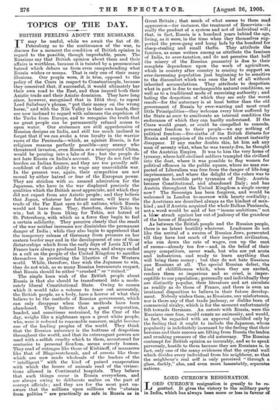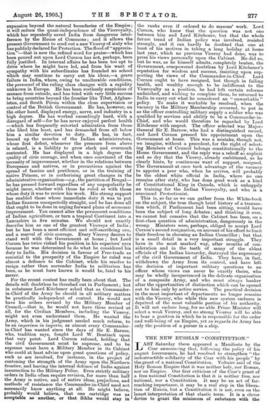expansion beyond the natural boundaries of the Empire ; it
will reduce the quasi-independence of the Viceroyalty, which has repeatedly saved India from dangerous inter- ference by the House of Commons ; and it allows the present Government to send out a new Viceroy of sixty who has publicly declared for Protection. The flood. of "apprecia- tion "—that is now the refined word for praise—which has been poured out upon Lord Curzon has not, perhaps, been fully justified. In internal affairs he has been too apt to drive where he might have led, and from his want of sympathy with his subordinates has founded no school which may continue to carry out his ideas,—a grave failure in India, where, owing to unalterable conditions, the personnel of the ruling class changes with a rapidity unknown in Europe. He has been restlessly suspicious of menace from outside, and has tried with very little success to bring countries beyond the frontier like Tibet, Afghan- istan, and South Persia within the close supervision or control of the British Government. Ho has, however, on the other hand, displayed energy, nerve, and industry in a high degree. He has worked exceedingly hard, with a disregard of self—for he has never enjoyed perfect health —which has frequently extorted admiration from those who liked him least, and has demanded from all below him a similar devotion to duty. He has, in fact, braced up the muscles of the Indian administrators, whose first defect, whenever the pressure from above is relaxed, is a liability to grow slack and overmuch contented. He has displayed in a high degree the quality of civic courage, and when once convinced of the necessity of iniprovement, whether in the relations between Europeans and natives, or in precautions against the spread of famine and pestilence, or in the training of native Princes, or in authorising great changes in the administrative organisation—e.g., the partition of Bengal— he has pressed forward regardless of any unpopularity he might incur, whether with those he ruled or with those whose duty it was to review his work. His strong support has enabled those whose immediate duty it was to put Indian finances unexpectedly straight, and he has done all that ought to be done in urging forward plans of economic improvement. You cannot alter the permanent conditions of Indian agriculture, or turn a tropical Continent into a Lancashire in five minutes. We should not exactly describe him as one of the greatest Viceroys of India ; but he has been a most efficient and self-sacrificing one, and a marvel of civic courage. Every Viceroy desires to staid well with the Government at home ; but Lord Curzon has twice risked his position in his superiors' eyes because he was determined to do what he considered his duty to India. His decision in favour of Free-trade as essential to the prosperity of the Empire he ruled was almost a defiance to the Cabinet, while his resolve to resign rather than surrender India to militarism has been, as he must have blown it would be, fatal to his career.
For the recent contest has really been about that. The details will doubtless be threshed out in Parliament ; but in substance Lord Kitchener asked that as Commander- in-Chief of the Army he should in all military matters be practically independent of control. He would not have his orders revised by the Military Member of Council,—that is, he would not have them revised at all, for the Civilian Members, including the Viceroy, might not even understand them. He wanted the Army, which in his judgment needed much reform, to be an imperium in imperio, as almost every Commander- in-Chief has wanted since the days of Sir E. Barnes, who, tradition says, fought Lord W. Bentinck upon that very point. Lord Curzon refused, holding that the civil Government must be supreme, and to be supreme must have a Military Member in its Cabinet who could at least advise upon great questions of policy, such as are involved, for instance, in the project of cantoning the strength of the Army upon the Northern frontier, and leaving the internal defence of India against insurrection to the Military Police. Even strictly military orders in India often require revision, for more than half the Army is native, and of native ideas, prejudices, and methods of resistance the Commander-in-Chief need not necessarily know anything at all. He might believe, probably would believe, that one cartridge was as acceptable as another, or that Sikhs would stay in the ranks even if ordered to do masons' work. Lord Curzon, who knew that the question was not one between him and Lord Kitchener, but that the whole future trend of Indian policy was involved, resisted strongly, and it can hardly be doubted that one at least of his motives in taking a long holiday at home last year, which no previous Viceroy had done, was to press his views personally upon the Cabinet. He did so, but he was, as he himself admits, completely beaten, the Government, overpowered doubtless by Lord Kitchener's reputation for wisdom and success, insisting upon sup- porting the views of the Commander-in-Chief. Lord Curzon ought to have resigned, but though in failing health, and wealthy enough to be indifferent to the Viceroyalty as a position, he had left certain reforms unfinished, and wishing to complete them, he returned to India to carry out what he considered an " unworkable " policy. To make it workable he resolved, when the vacancy in the Military Membership occurred, to put in as the officer controlling military supply a soldier who was qualified by services and ability to be a Commander-in- Chief, and who would therefore be regarded by Lord Kitchener with respect. The officer selected was Major- General Sir E. Barrow, who had a distinguished record, and Lord Curzon pressed his appointment upon the Government at home. This was a mistake, though not, we imagine, without a precedent, for the right of select- ing Members of Council belongs constitutionally to the Home Government, and the reply was a rebuff so explicit and so dry that the Viceroy, already embittered, as he clearly hints, by continuous want of support, resigned. The Government at once took advantage of the vacancy to appoint a peer who, when he arrives, will probably be the oldest white official in India, where no one remains after sixty, who has done good work as a kind of Constitutional King in Canada, which is unhappily no training for the Indian Viceroyalty, and wile is a convinced Protectionist.
This is, so far as we can gather from the White-book on the subject, the true though brief history of a transac- tion which, if Parliament had been sitting, would have been the subject of long debates ; and thinking it over, we cannot but conceive that the Cabinet has been, on a, first-class question of administration, dangerously in the wrong. Ministers were, perhaps, obliged to accept Lord Curzon's second resignation, on account of his effort to limit their freedom in choosing an Indian Councillor ; but that is a small detail in a very important struggle. They have in the most marked way, after months of con- sideration and in the teeth of many of the ablest officials of the Indian hierarchy, destroyed the supremacy of the civil Government of India. They have, in fact, withdrawn the Army from its control, and have left the decision of important military questions to an officer whose views can never be exactly theirs, who may be wholly inexperienced in the delicate organisation of a composite Army, and who must always hanker after the opportunities of distinction which can be opened out to him only by active service. The practical decision in the most important of departments no longer remains with the Viceroy, who while this new system endures is deprived of the most valuable portion of his authority. It will not endure long, for no able Prime Minister will select a weak Viceroy, and no strong Viceroy will be able to bear a position in which he is responsible for the order and well-being of an Empire, yet as regards its Army has only the position of a purser in a ship.



































 Previous page
Previous page